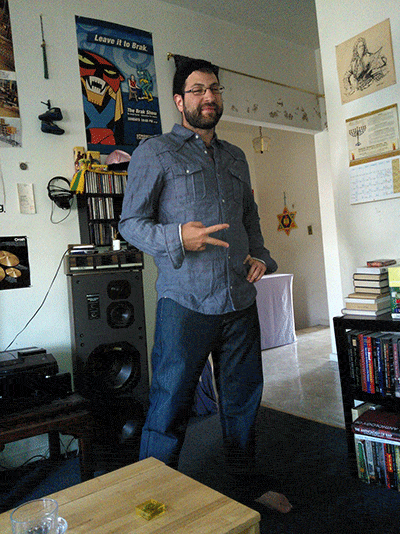AHA members are involved in all fields of history, with wide-ranging specializations, interests, and areas of employment. To recognize our talented and eclectic membership, AHA Today features a regular AHA Member Spotlight series.
 Daniel Cipriani is PhD candidate and teacher. He lives in Highland Park, New Jersey, and has been a member of the AHA since 2010.
Daniel Cipriani is PhD candidate and teacher. He lives in Highland Park, New Jersey, and has been a member of the AHA since 2010.
Current school or alma mater/s: I currently attend American University, located in Washington, DC. I received my BA and MA from Brooklyn College, CUNY.
Fields of interest: My main field of interest is modern American history, with an emphasis on the history of popular music and popular culture. I am also interested in Jewish and Israeli history. I am currently working on my dissertation, which is on Jews and hip hop, where I explore the many roles of Jewish personalities who helped nurture the culture, especially through the recordings of rap music. I have many other interests such as presidential history, African American history, and the relationship between Jewish American and African American personalities and communities. I have also attended a Jewish school (a Yeshiva) in Israel, making me interested in Jewish liturgy, law, and history.
When did you first develop an interest in history?
Being born in Israel made me very aware of my cultural and traditional past. My school curriculum was steeped in Jewish and Israeli history, so naturally I developed a taste for other topics. Also, living in Israel gave me a sense of the exoticism of America. Hence, I became very interested in American history.
What projects are you working on currently?
I am currently working on my dissertation, which will cover the history of Jewish participation in hip hop culture, especially chronicling the recorded music known as rap music. I will also make a companion visual documentary along with the written project, which will be more popular in its scope and appeal.
Have your interests changed since graduate school? If so, how?
Yes, but I would not use the word change. I would say that my thoughts and interests have evolved. I began my work on my PhD right after my tenure at a Yeshiva, hence I was a bit more rigid. However, the more I attended classes, read various works, and engaged in conversations, I became more aware of the depth of all topics.
Is there an article, book, movie, blog etc. that you could recommend to fellow AHA members?
Oh yes, I just picked up a great read and visual documentation of the early years of hip hop. The book is titled The Hip Hop Family Tree, and it spans from the early 1970s to 1981. It’s a popular and very non-traditional type of history book. The comic/history book by the very talented Ed Piskor conveys the early stories in a majestically fluid way. It gives you the details of the specific parties in the Bronx, the many personalities and their foibles, along with many small tidbits inserted into each panel. It is great because this is a new method of presenting a history that has become so mythological. Keep your eyes open for the second volume, which is dropping this August! Another great article I read recently is from the online Tablet Magazine. The article, titled “The Deep Jewish Roots of Kanye West’s Awesome ‘Blood on the Leaves’” and written by David Meir Grossman, is a great in-depth analysis of Kanye West’s song, from his most recent album, Yeezus. The article is on his song and its direct connection to the sample used, which is from “Strange Fruit” written by the Jewish Abel Meeropol. I would also recommend my blog: https://djewhiphopman.wordpress.com/, where I cover hip hop and Jews and everything else in between.
What do you value most about the history profession?
I feel that it’s gotten such a short shrift in the new age of emphasis on business and economics degrees. I most value the idea of spreading knowledge and history to a larger audience. I also value how history can throw students the curve ball by discrediting or disavowing preconceived notions they learned in high school or from family, and other media and cultural outlets. I always thought that the most effective teachers were the ones who communicated these ideas clearly, but with a kick to it.
Why did you join the AHA?
Truthfully, as a PhD candidate I wanted to enter myself into the discussions and debates that will influence my future career. I feel that the AHA is a great forum for all history scholars to share ideas and report in new types of history and historical methods.
Other than history, what are you passionate about?
Music is my bloodline, and it makes the soul soar in such indescribable ways. Being the son of a musician and a midwife I have always been a music lover. I think all genres and types of music can be amazing, and their back stories and history are just as amazing. I also love art, and I delved into many of the mediums including oil painting, acrylics, pencils, and at this point collage work. Music and art have always been a deep passion of mine. I’m also a devoted and passionate Jew. I take my Judaism and the way I practice very seriously, as I’m deeply devoted and passionate to learn and go through the various age old texts of illumination.
Any final thoughts?
The work I do is from what I would consider an “emerging field.” I would pose this question to the higher ups at the AHA. What can you do for the new age scholars and more importantly, what will happen to the future of the field? The university method of being a tenure track professor is falling by the wayside. How can the AHA provide support for these people, including myself, who will be struggling to find work?
This post first appeared on AHA Today.
This work is licensed under a Creative Commons Attribution-NonCommercial-NoDerivatives 4.0 International License. Attribution must provide author name, article title, Perspectives on History, date of publication, and a link to this page. This license applies only to the article, not to text or images used here by permission.


